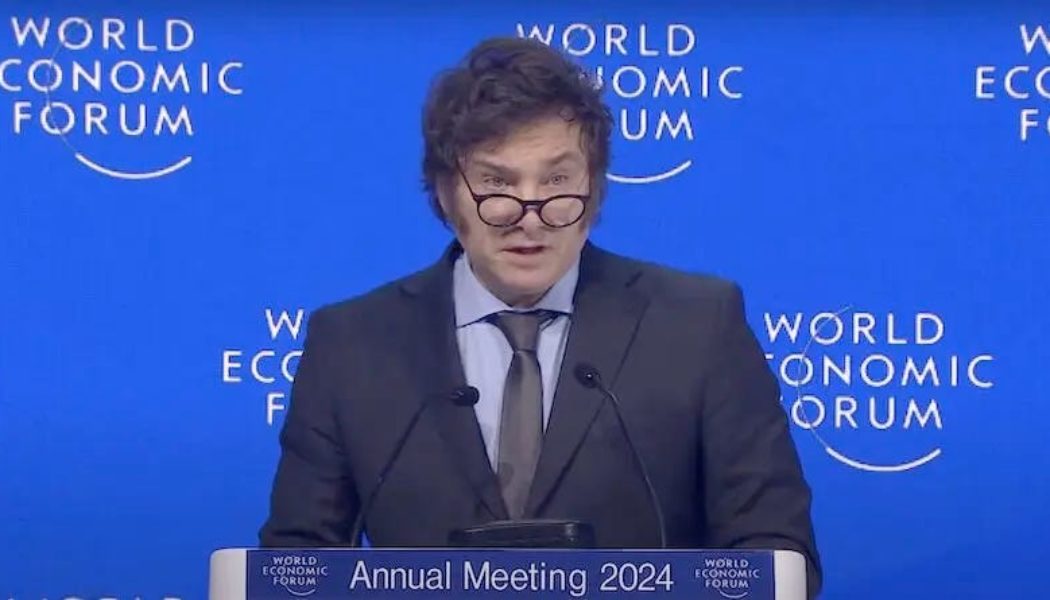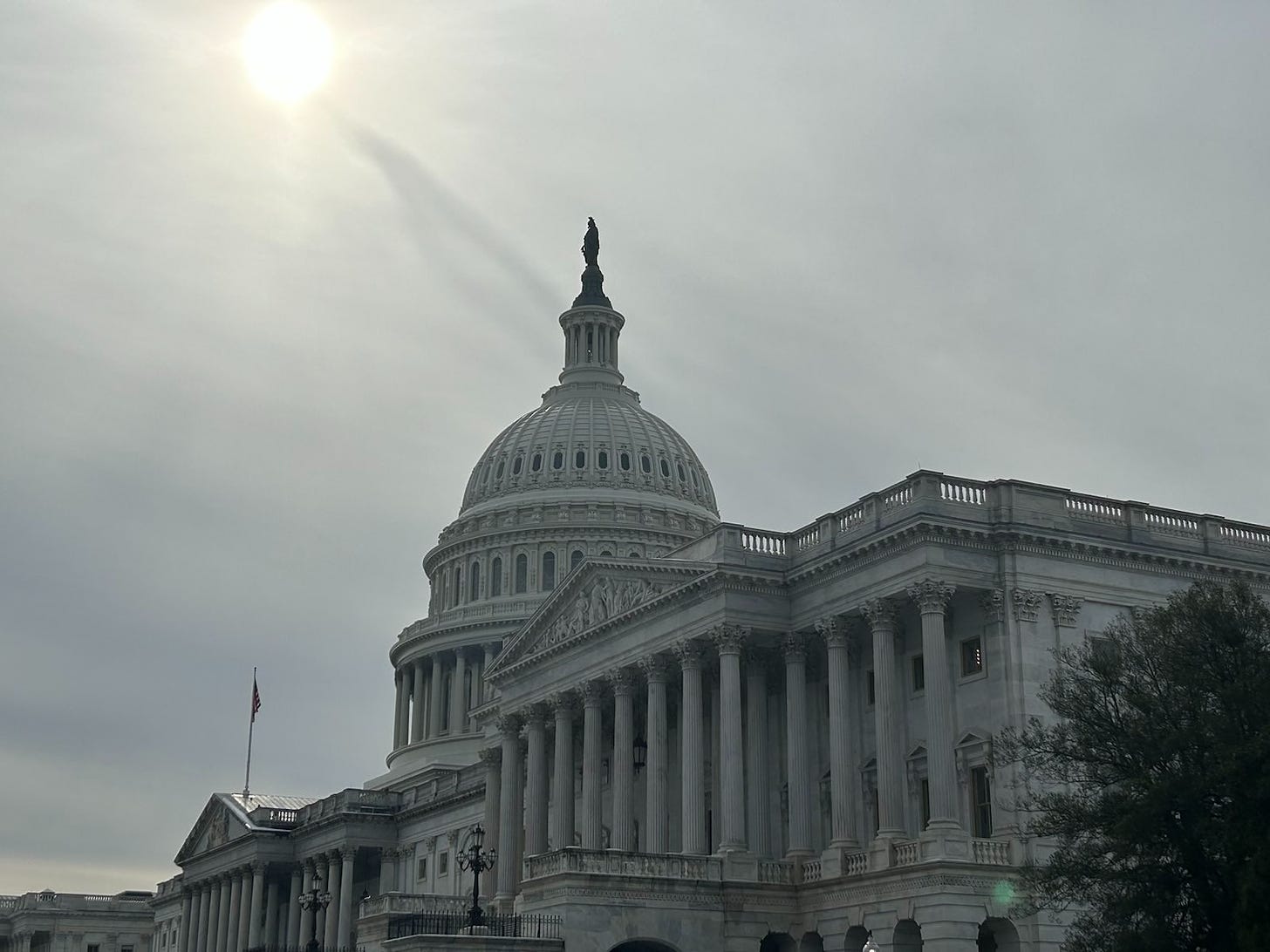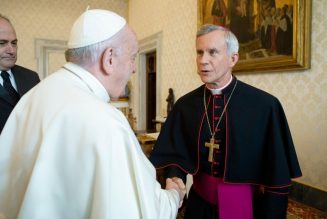Happy Friday friends,
I’m feeling pretty much like the world could end at any time. That might seem a little bit dramatic, I’ll concede that up front.
And where I’m going with this is going to strike some of you as silly and overwrought.
But I’m mostly serious. Just hear me out.
I started the week ranting to the Mrs. about this shiny new breed of AI software that allowed a speech at Davos, delivered in Spanish by the Argentine president, to be seamlessly and simultaneously rendered into English, in his own voice and accent, with his mouth augmented to fluently fit the translation.
If we can do this, I said, we can never know what’s real again unless we see it with our own eyes.
Harmless enough in the grand scheme of things, but I think this is just the beginning.
Imagine that shortly after Election Day in November the result is in dispute, subject to recounts and court cases.
Now imagine a fake “leaked” video emerges, appearing to show Donald Trump saying he wants his supporters to march on Washington to storm the Supreme Court, or seize the White House. Or one appearing to show Kamala Harris discussing Biden’s mental state and her intention to invoke the 25th Amendment in the first weeks of a new term.
How many minutes on TikTok would it take for any of that to go viral, and at what consequence?
Would any denial or any debunking be enough to convince even half the country that something like that was fake — and which half? What are the odds it would occasion an actual riot, and then counterriots?
Let’s dial the stakes up higher.
Let’s say the deepfake is of the Ukrainian president saying something truly outrageous, like his special forces are smuggling a suitcase nuke into Moscow — what do you suppose the Russians would justify doing with that? And what response could or would the West deploy?
The people who do the Doomsday Clock set the time at 90 seconds to annihilation this week. It’s an alarmist PR stunt, to be sure. But even a fake clock can tell the right time once in a while.
I don’t have a plan to mitigate any of this, by the way. But neither does anyone else — and there doesn’t seem to be any sense of urgency around it either. That’s what I find really frightening.
I’m aware this is a bit full on for an opening. I’m sorry about that.
By way of an apology, and a palate cleanser, here’s an archive video of the BBC interviewing a man as he sets a world record for putting live ferrets down his trousers.
Enjoy that.
Then, here’s the news.
The News
The German bishops are worried, very worried, about the rise of the new right in their nation’s politics. Some of them are even taking to the streets.
As Luke described in a really interesting analysis this week, the country’s Rechtsruck, or rightward shift, dates back years and has its roots in several different social realities and political events.
And, as Luke reports, supporters of the Alternative für Deutschland (AfD) party may bridle at the label “far right” but it’s hard to escape that impression, given some of the ideas and proposals emanating from its wider movement.
But what, if anything, can the bishops do? And how are the country’s Catholics dividing their votes in all of this?
—
The Vatican City Court of Appeals has found a former pre-seminary rector guilty of corruption of a minor.
The verdict was a partial reversal on appeal of a previous decision, which had acquitted the priest due to insufficient evidence.
—
This week marks the one-year anniversary of the so-called Richmond memo, the leaked FBI paper calling for surveillance and infiltration of “radical-traditionalist Catholic” parishes to combat their supposed threat to national security.
I was also on Capitol Hill Tuesday to attend a Mass in the extraordinary form of the liturgy. While the Mass celebrated the Feast of St. Raymond of Peñafort (patron saint of canon lawyers, by the way) it was really held to mark the memo’s anniversary and make the point that liturgically traditional Catholics “aren’t terrorists,” as one of the Mass’ organizers put it to me.
You can read our report of the Mass here.
—
A Spanish priest in Valencia was found dead in his bedroom this week at the age of 80.
Despite no signs of violence or forced entry, the case was immediately treated as suspicious when the janitor who found the body of Fr. Alfonso Benito López started receiving text messages from the priest’s phone.
Later in the week, though, an arrest was made — a 40-year-old Peruvian migrant with no criminal record.
A gathering storm
A story which attracted little attention this week, but should have, was the decision by a Vatican City court to throw out a lawsuit brought by Libero Milone, the first and former auditor general of the Vatican.
Milone, appointed by Pope Francis in 2015, and forced from office in 2017, alleged wrongful dismissal and sued the Secretariat of State, whom he blamed for ousting him and trashing his professional reputation in the process.
Milone and Pannico (who, again, I stress, died last year) were also ordered to pay a combined total of more than 100,000 euros in court costs.
On all this, I have some thoughts.
For a start, I thought the decision coming out right as Milone’s old office announced a new “whistleblowers email hotline” was grimly hilarious.
I also thought that the then sosituto at the Secretariat of State, Pillar reader and convicted criminal Cardinal Angelo Becciu, taking public credit for working with the gendarmes to effect the auditors’ forced resignations at the time it happened might have led judges to a different conclusion.
I would have thought that when a convicted abuser of high Vatican office boasts of having used his office to exactly the end Milone and Pannico argued — forcing them to resign — and for exactly the reasons they said — to halt their prying into his illegal financial operations — judges might conclude that Becciu’s department was, indeed, involved.
I would also have thought that when a plaintiff dies in the middle of a lawsuit in which he also charges the Vatican seized his personal medical records, halting his diagnostic treatment and contributing to a cancerous death sentence, the court might think twice about sending his grieving widow a bill for 65,000 euros in court costs, instead of the pension he was suing for.
The Vatican court thought differently, though. And now we will wait to see what happens next.
Milone has previously said he deposited with the court proof, hundreds of pages of documentary proof, of systematic curial financial corruption right to the highest levels and that he would consider making it all public if he is denied justice.
For the moment, he’s keeping his powder dry, refusing to comment beyond telling me he’s meeting with his lawyers in the coming days to game out their next move.
It’s not for me to tell him or the Vatican judges what to do. But as all sides consider Milone’s avenues of legal appeal, I think they’d do well to consider what could happen next.
If Milone does have, as he claims, proof that the Vatican is riddled with the kind of financial corruption which has already brought waves of scandal on the Church, and if he can mount a compelling case that he’s been systematically hounded from office and denied compensation, the results could be ruinous for the Holy See.
Proof of cardinals lining their pockets and continuing in office could be the final nail in the cash-strapped Vatican’s financial coffin.
Worse, convincing evidence that the government of the Holy See is really a kind of clerical kleptocracy could havel repercussions in the realm of international law — there’s never a shortage of calls for the Vatican to lose its unique sovereign status, and evidence of systematic corruption could tip the balance with international bodies, political and financial.
Anyone who thought the conclusion of the financial crimes trial last month would close the book on Vatican legal scandals was, I am afraid, mistaken. On the contrary, the weather is looking right for an almighty deluge to come.
Capitol Hillsong
I suppose I always assumed I’d go to a sung traditional Latin Mass one day, but I didn’t expect my first invite to be on Capitol Hill.
Though I don’t know what I was expecting, exactly.
Given the pictures and occasional videos I’d seen of TLM liturgies over the years, I suppose I was expecting gothic architecture, marble and gilt everywhere, clouds of incense borne aloft on the soaring tones of a full schola.
If you’d asked me to describe a hypothetical TLM congregation, it would probably have conjured a textbook image of tradical chic, ladies draped in lace dotted about the assembly like snowy islands amid a sea of bow ties and pocket watches. Below adult eye level, fedoras cast along the pews like scatter cushions, and ranks of little combed heads, arranged neatly in descending age order, like something out of Norman Rockwell.
Because if the extraordinary form of the liturgy is about anything, it’s about the aesthetics — right? The look, the sound, the smell, the totality of people and place and thing, that’s what is supposed to make it seem so timeless, so magical, to newbies like me.
What I was not expecting was a modest set-up, in a hastily repurposed conference room, gray carpet with a bare folding table for a makeshift altar.
For every mantilla in the crowd, there was a pair of sunglasses perched on a head, a big bow, or a home-knitted hat. Forget about ladies in demure floor-length skirts. Jeans and knee-high boots were more the order of the day.
And faux fogies? Not a chance. Apart from my own suit, there wasn’t a scrap of tweed in the place. However recherché their liturgical tastes, the male Congressional staffers I saw Tuesday prefer the shrunken suits and tan shoes à la mode with the young bucks of Capitol Hill.
If the G-men are using these people for a terrorist identikit, it must be giving them conniptions of paranoia; they look just like everyone else in the building.
While the venue was pro tem and the fashions contemporary, the singing at least was timeless, led by a pair of clearly accomplished cantors.
The liturgy itself was an interesting affair. There wasn’t a single bell or smell in the place — incense and fire alarms make poor bedfellows. But, as advertised, the priest (the anonymous priest) conducted the Mass ad orientem (strictly speaking, I think the wall faced westward, but it’s the idea of East that matters, I suppose) and sotto voce.
It was a first for me. At times, it was not unlike trying to overhear the only conversation in a quiet cafe. It left me with the same sense of mild social transgression, too.
Of course, the whole event was transgressive, and canonically illicit. Since I was invited to attend the underground Mass on the hill as a journalist, the need for strict objectivity barred me from fully participating and receiving Communion. I may have accidentally lapsed into prayer at times, but this is something to bring up with my confessor in due course.
The occasion was to mark the first anniversary of a memo from the FBI’s Richmond field office, branding so-called radical-traditionalist Catholics a domestic terror threat. I scanned the assembly for possible agents of chaos, ready to run amok at the seat of government. Perhaps that mother in the corner was nursing something more sinister than a baby under that blanket?
I looked, too, for an FBI plant among the faithful. Someone with classical instead of ecclesiastical Latin pronunciation, maybe. Or anyone touching their ear as they prayed quietly into a lapel mic.
It seems odd to brand the people I met as a threat to anything. Chatting informally to them before and after Mass, they seemed no more or less conservative, or political, than the average congregation in D.C., this despite them being a moment’s earnest stride from the well of the House.
The people were prayerful. The rosaries hanging from dutifully folded hands were maybe a little longer than the average, but once you’ve swapped the splendor of a well-preserved chocolate box parish for a slightly shabby meeting room, the overall effect is that of a quiet retreat in a conference hotel. Reverent, pious, a little different for sure, but is this what all the fuss is about, really?
I can’t say I get it. I don’t get the supposed threat this Mass is meant to pose — to the safety of the Republic or to the unity of the Church. But whatever the threat is supposed to be, it’s taken seriously enough that the Cardinal Archbishop of Washington calling the Speaker of the House to shut it all down was considered a live possibility.
And punitive consequences seem assured for the priest celebrant, if his name becomes widely known. And, I would add, those sanctions will be merited. Whatever the sincerity of their pastoral sensibilities, clergy shouldn’t break the law without expecting the prospect of sanction.
More to the point, knowingly breaking the law — and reminding your flock that’s what you’re doing before beginning Mass — sets an example and teaches a lesson about respect for the Church’s authority.
By the time I was back at my desk Tuesday afternoon, the online Catholic police were out in full force, trying to winkle out his name. But there is something almost too funny to be serious about the militant felt-banner wing of the Church taking to twitter.com to denounce a Mass in a meeting room for not having the proper paperwork.
On the other hand, it is the curse of marginal communities that they do attract fringe figures and embarrassing champions.
For every I-don’t-know-how-many-dozens of quiet, nice, normal Catholics who just like a bit of Latin, there seems to be an inevitable nutjob in a borrowed saturno insisting that the ordinary form — indeed the whole post conciliar Church — is vulgar and invalid, our culture decadent and depraved, and that we all need a little more Vlad Putin in our lives.
It’s become part of the landscape.
It’s now the done thing, if you’re a priest or religious community gone rogue (or just downright bad), to make “going full trad” your final act of defiance against Church authority, and your primary income stream once you’ve been suspended by your bishop.
The internet is littered with solicitations for “persecuted priests” in their private ministries, their delusions of messianism sustained by the misplaced charity of nice people — ecclesiastical pigeons fed to fat, despite the signs saying “please don’t feed the birds.”
Malcontents and mountebanks are nothing new to the Church, and no amount of liturgical uniformity would stamp them out. But they provide an easy reason to demonize anyone they sidle up next to.
Meanwhile, back in room H-137, no one whispered about the invalidity of the “bogus ordo” or the illegitimacy of “Mr Bergoglio,” still less seem enthused about a new American Reich.
The people I met struck me as liturgical libertarians, not the crypto-fascists the FBI seem to imagine. If they have a criminal bent, it’s canonical, and in the sense that no bishop is going to tell them successfully where and how they have to go to church. And they feel justified in their defiance, insisting that the bishops demanding their obedience now were loath to show it themselves when Benedict XVI was pope and on their side.
But is that a spirit of good Catholic docility? No. And was the Mass I saw canonically licit? No.
The congregation was, I suppose, on the younger side, literally and spiritually speaking. There was enthusiasm and faith, for sure, but also a whiff of knowing rebelliousness about the whole thing.
If the expectation is, as Cardinal Gregory has suggested, that this sort of “traditionalism” will die a “slow, bloody death” it may prove misplaced, unless bishops are prepared to get very punitive indeed.
What the people I met say they want — and are determined to have whatever the Church tells them to the contrary — is the TLM. But shorn of the “extras” afforded by grander settings, what they have got seems not vastly different to what I want and have most Sundays: simple, reverent liturgy.
It was beautiful, to be sure. And miraculous, in the way every Mass is.
So, what’s the big deal? I don’t mean that rhetorically. It’s a serious question.
If it’s all a matter of reverence and style, it seems an odd thing to strain the bonds of Christian obedience and communion for a preferred, prohibited, liturgical form when you could otherwise achieve the same ends. Surely there must be a question of substance, the very substance of the sacraments, to make all this worth it?
Maybe there is something else lurking under the surface. Maybe all the people I met secretly harbor pre-conciliar revanchist fantasies. Maybe all the smiles and friendly greetings and happy children are part of the act — ecclesiastical offerings of motherhood and apple pie to sucker you in and soften you up for the straight dope later.
Or maybe the suspicion, cultural and generational, has become so deep and so mutually reflexive that the radical chic of the underground has become its own justification and reward.
Maybe what’s really lacking is understanding, dialogue, catechises and half a dozen other Churchy buzzwords that actually can and should mean something important.
And maybe if bishops talked a little less of slow, bloody deaths and a little more of paternal solicitude, that might help, too.
I don’t know, but that’s what I think. For what it’s worth.
See you next week,
Ed. Condon
Editor
The Pillar
Comments 159
Services Marketplace – Listings, Bookings & Reviews











